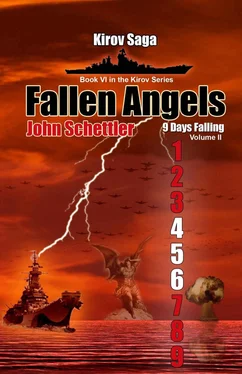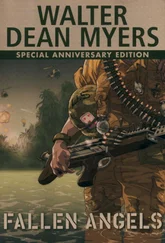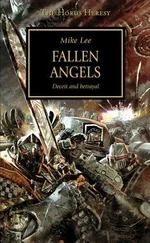He looked at them, three of his four little darlings, one of the fastest helicopters he’s ever flown. He could fly circles around the Apache in his X-3, but when he thought about the Russian SAM batteries his bravado was quashed. There’s one thing the damn Russians get right, me boyo, he thought, and that’s missiles. We’re going to be out there alone with the gods, and the night will flame with fire.
And that soon…
“I never trust a fighting man who doesn’t smoke or drink.”
~ Admiral Bull Halsey
AirmanJ.D. Pickett was scouring the seas ahead in his Helldiver , leading in a section of five planes that morning. Behind him were the lines of the remainder of the squadron, two more flights of five SB2C-5 Helldivers like his own, followed by three groups of five TBM-3 Avenger torpedo bombers. A thousand feet above them were the Hellcats , long lines of fighters, and many with 500 pound bombs under their wings in the fighter/bomber role. Others carried the HVAR Rocket System the men called “Holy Moses” due to the reaction they had when the airmen first saw the weapons fire and streak in towards their targets.
They were about to see something an order of magnitude better, and then some. Pickett spotted it, coming up at the formation with impossible speed. “What in God’s name is that?” he called through his headset. “Coming up on my twelve o clock! Rocket! Rocket!”
The explosion said the rest as the rocket flashed in and struck a Corsair flying off the rightmost wing of his flight. He craned his neck to see the bright yellow fireball consume the plane and saw the smoldering remnant falling from the sky.
“Holy shit!” he yelled, all thoughts of Moses blown from his mind by that fireball. “Did you see that? Anybody see what fired that? I don’t have anything on radar. Can’t see a thing.”
The first missile was a warning shot. Karpov had ordered Orlan to fire this single missile at the first planes they could track inside 100 kilometers. He was back on the radio to see if Iron Mike might have a change of heart, but the effect of the missile shot was a bit like poking a stick into a hornet’s nest. The Americans quickly shook off the shock and they were calling to one another, orders barked sharply over the airwaves.
“Louis! Get your Avengers down on the deck! Pickett, you peel off to your left and swing round on 290. Everybody upstairs get ready to rumble!”
Vern Higman heard the order and reached in to pat the dash board of his plane—‘Round Trip Ticket.’ They were going in again, but even though he had seen planes shot up pretty bad he always came through in one piece. This would be no different. He looked out his cockpit window and saw Wendell Stevens and Lowell Chamberlain both give him the thumbs up. The others were itching to dive the instant they laid eyes on the target—Bob Nouall, Mike Hallard, J.G. Wheeler, who already had one Navy Cross on his chest for blasting the Japanese Cruiser Tone a while back.
“Let’s get down and dirty,” Higman called to his Helldiver flight mates. “I’ve got me a round trip ticket to the action and a thousand pounds of metal in my belly that I plan to put right on Ivan’s foredeck! You ready Pickett? Lead the charge!”
Pickett was ready, but so was Orlan .
* * *
“Foolsrush in,” said Karpov, shaking his head as he watched Orlan firing off his starboard bow.
“Where Angels fear to tread,” said Rodenko at his side, the duty on his radar assigned to a Lieutenant. He was acting Starpom now, and promoted to Captain Lieutenant. When the ship was at action stations he was up and at Karpov’s side, inwardly proud of his promotion and ready for both the new authority and responsibility it brought him. Always a level headed man, Rodenko remained cool under fire and was a natural leader for all the junior officers in his section during the ship’s earlier ordeals. While he had never mustered the courage to confront Karpov in the beginning when he opposed Admiral Volsky, he regretted that now that he knew what it felt like to be standing in command level officer’s shoes.
When Fedorov had been promoted to Starpom , and then ship’s Captain during Karpov’s rehabilitation in the Med, Rodenko never fretted or felt passed over. He saw how the young Fedorov was struggling to assume his new role, seeing he was over his head in many ways, and tried to help him as much as he could. The cooperative relationship he managed to forge with Karpov was inspiring to the entire bridge crew, and with Orlov gone, things seemed much more stable on the ship. Now his tactical sense, overall situational awareness born of his years as a radar man, and his general competence made him perfect for the role as the ship’s Starpom , Executive Officer and second in command after Karpov on the fleet’s flagship.
He admired the Captain’s skill at the helm, particularly in combat, and it was true that Karpov had saved the ship many times in tight situations. But Rodenko had seen, and knew well, the darker side of Karpov, and now that the ship had regressed again in time, he began to perceive the Captain’s shadow thickening on the deck of the bridge again, and flashes of his old self—his ambition and yes, his arrogance was apparent at times, particularly after their battle with the US Captain Tanner and CVBG Washington .
Rodenko knew that had been a real threat, and that circumstances and strong support from both the Naval Air Arm and the undersea boats had been decisive in the engagement. If the fleet had faced the Americans without them, things might have been very different. The initial eruption of that volcano had also forced the Americans to divert left and right to avoid the ashfall. While Karpov was clever in moving the ship south beneath the ash cloud that morning, they had still seen a Harpoon come within a whisker of striking the ship. Varyag had saved the day, and then all hell broke loose when that volcano erupted again.
Now, thrown back into the same impossible situation as before, Karpov seemed to regress in his behavior, his own inner Demon restlessly awakening in the heat of imminent battle. Rodenko had seen how both Volsky and Fedorov had served as strong counterfoils to Karpov before, and wondered how he would measure up to that task. In the end he realized it was his job to give the Captain his best judgment in any situation they encountered, and his best effort at the helm.
“They have no idea what they’re facing,” said Karpov. “And that’s why they seem so brave, I suppose. If they knew there was no way they could penetrate our SAM defenses, they might fear the skies over this ship.”
“But they don’t know,” said Rodenko. “Which is why it hurts a bit to watch this.”
Karpov turned his head, lowering his field glasses, but said nothing. The light in his eyes was lit by the flames of battle. The action had moved inside the 50 kilometer range circle, and radar reported that the formation was pressing doggedly forward. Orlan had fired three salvos of eight, and she was near perfect. Two of the missiles had consumed the same plane when they tracked in on fireballs, moving too fast to switch to a new target in time. They had listened to the reports on radio from Orlan . 22 kills, and yet they came. Karpov was holding all his precious S-400s in reserve and letting Orlan do the fighting at this point, but now he turned to communications with an order.
“Mister Nikolin, signal the flotilla. Tell Captain Yeltsin aboard Orlan that they have led the way ably and we will now join the action with our Klinok system while they switch to short range munitions. Admiral Golovko will continue to hold fire unless directly attacked, and then they are authorized to use their close in defense systems.”
Читать дальше











